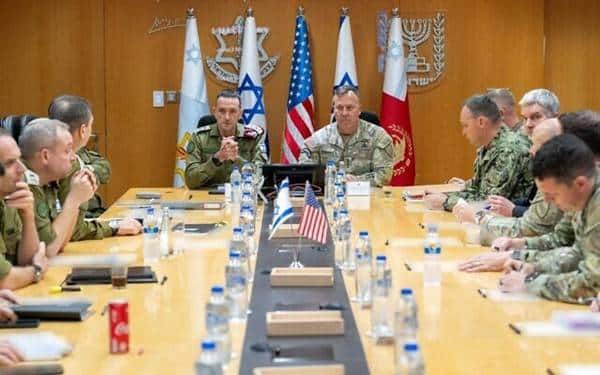
Overview
- After threatening that it would attack Israel directly from its territory, Iran sent over 300 cruise missiles, ballistic missiles and drones towards Israel. This is the first time Iran directly attacks Israel from its own territory.
- 99% of the aerial threats were intercepted by Israel, Jordan, US and the UK. Only the ballistic missiles crossed into Israeli airspace and 100% were successfully interpreted by the Arrow 2 and Arrow 3 systems, proving their effectiveness in their first major operational capacity
- Iranian commandos took control of a commercial ship, MSC Aries in Gulf of Oman. The ship is associated with Israeli businessman, Eyal Ofer via his company, Zodiac Maritime. Iran said that it would bring the captured ship to Iran.
- The European Parliament passed resolutions condemning UNRWA and the Palestinian Authority for producing textbooks and teaching materials that led to a massacre and war. The Parliament stated that “education to hatred has direct and dramatic implications,” referring to the “despicable terrorist attacks carried out by Hamas on October 7.”
- Biden delivered a speech where he said that his commitment to Israel is still “ironclad” and repeated a similar message from previous speeches when he told Iran “Don’t!”

- According to various reports, Indonesia, the world’s largest Muslim country commits to normalizing its relations with Jerusalem. In return, Israel will remove its opposition to Indonesia’s joining the OECD. Officially, the Indonesian foreign ministry denies the report.
- After the previous suggested hostage deal included the release of 700 Palestinian terrorists from Israeli jails in exchange for 40 Israeli hostages, Hamas increased their demand to 900 prisoners including at least 100 terrorists who are serving life sentences for murdering Israelis.
- Prime Minister Netanyahu has declared that there is a set date for the Rafah operation while Gallant reportedly contradicted it in a conversation with US Defense Secretary Lloyd Austin. He said that Israel would have to take several crucial steps before an operation commences, including an orderly evacuation of the civilian population and an increase in humanitarian aid.
- After months of inconsistent claims and exaggerated casualty numbers, the Hamas-run Gaza Health Ministry admitted on April 6th that they had manipulated the numbers of casualties by saying that it had “incomplete data” for 11,371 of the 33,091 Palestinian fatalities it claims to have documented.

- The IDF has pulled most of its troops from Gaza leaving only one Brigade to take the post in the new 749 Route (Netzarim Corridor) dividing Gaza Strip from North to South.
- The IDF eliminated three sons of Hamas’ political bureau chief Ismail Haniyeh. The three were on their way to carry out a terrorist activity in the center of the Gaza Strip. It was reported that one of Haniyeh’s sons, was involved in the holding of Israeli hostages.
- The Israeli Coordinator of Government Activities in the Territories (COGAT) reported that, the repair of the Bani Suheila water line has been completed. The water line will now supply over 400,000 people in central Gaza with an additional 42 liters of high-quality water per person each day.
- Jerusalem resident, Benjamin Achimeir, 14, went missing while shepherding. His body was later found by security forces in the Binyamin region, and a man hunt was opened to find his murderers after the incident was determined to be a terrorist attack.
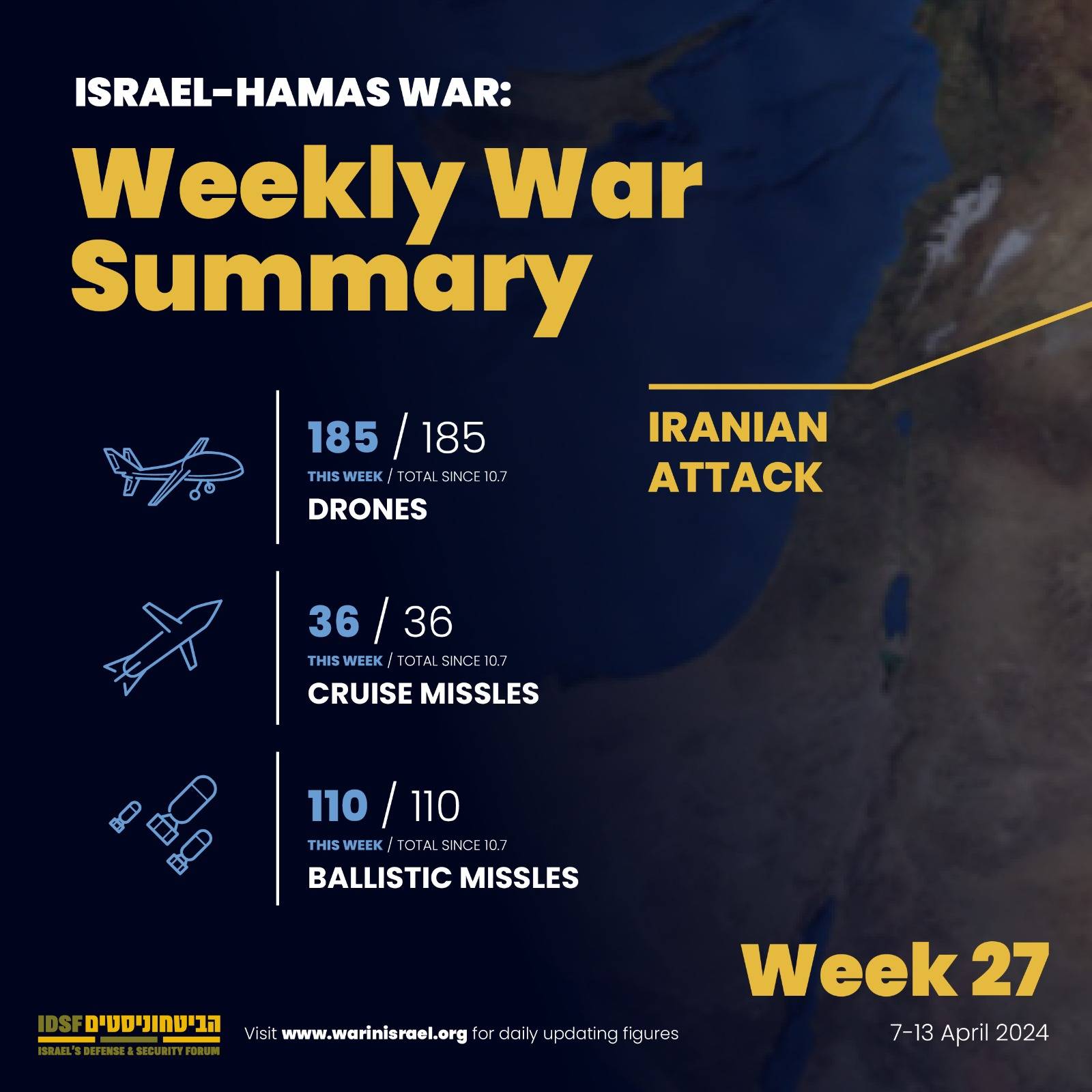
Iran
The major event of the week is Israel’s escalation with Iran. After the killing of a senior IRGC general in Damascus, Brig. Gen. Mohammad Reza Zahedi, commander the Quds Force in Syria and Lebanon, allegedly by Israel, Iran vowed to retaliate and “punish” Israel. US intelligence indicated that Iran would be likely to strike on the weekend and gave an approximate 48-hour window.
According to various reports, Iran communicated to Washington via European countries that it does not seek escalation and would respond in a manner that will maintain the equation and won’t seek to escalate the conflict further. It also warned the US that if it intervenes, Iran would attack US assets in the region including US troops. Iranian officials have communicated that they also see the US as responsible for the attack while White House spokespeople repeatedly said that the US had nothing to do with the attacks. Iran’s mission to the UN earlier issued a warning to both Israel and the US “should the Israeli regime make another mistake, Iran’s response will be considerably more severe,” it wrote online. “It is a conflict between Iran and the rogue Israeli regime, from which the US MUST STAY AWAY!”
This comes after Kuwait and Qatar, two designated “major non-NATO allies” would not allow the US to use their military bases in their countries to retaliate against Iran. This development demonstrates the weakness of the White House vis a vis Qatar, as Qatar is very comfortable in using its leverage against the US while the US is reticent to use its powers against Qatar. In fact, the Biden administration only bolstered Qatar’s global image and diplomatic leverage- it gave Qatar the “Major non-NATO ally” designation in 2022 citing its help in the 2021 Afghanistan withdrawal, renewed its agreement to keep operating the largest US base in the Middle East, Al Udeid Air Base, for 10 more years, and gave unprecedented deference in the hostage negotiations by praising Qatar’s role. The American posture in the region is weakening, while emerging powers are leveraging the America’s reluctance to project its power.
The US, very wary of a potential regional war with Iran sent its top generals and spokespeople to the media to communicate that the US does not seek conflict, on the one hand but will remain committed to Israel’s security, on the other. The U.S. envoy to the Middle East, Brett McGurk, called the foreign ministers of Saudi Arabia, the United Arab Emirates, Qatar, and Iraq, requesting them to convey a message to Iran. The message urged Iran to refrain from escalating tensions with Israel. Biden delivered a speech where he said that his commitment to Israel is still “ironclad” and repeated a similar message from previous speeches when he told Iran “Don’t!”

Biden’s National Security Spokesperson, John Kirby, was sent on a media tour to deliver the message that the US is monitoring the situation and is looking to take precautions to contain the situation and avoid any optics of a larger conflict. These same messages were reiterated by the Chairman of the Joint Chiefs of Staff, Charles “C.Q.” Brown Jr. in his first major round of media appearances.
The White House is evidently very worried about the appearance of supporting or accepting of an escalation to a larger regional conflict – a sentiment that exists throughout much, but not all of the American political spectrum. The White House’s strategy includes a need to avoid further foreign policy conflicts, and also the refusal to accept a larger conflict which is perceived to have negative political consequences for an incumbent President in an election year.
The US coordinated with Israel’s military potential scenarios of an Iranian attack on Israel and sent some of its military assets to the region including battleships to deter a possible escalation. CENTCOM commander, Michael Kurilla visited Israel and met with his counterparts from the army, as well as Minister of Defense Gallant to coordinate strategies and plans of actions. In an unprecedented move, he also was part of the IDF’s General Staff discussions. Minister Gallant spoke with his American counterpart, Secretary Lloyd Austin to discuss preparation for an Iranian attack. The US wants to keep its bearhug to Israel tight to avoid any Israeli actions that would come as a surprise without coordination. The US is very wary of Israeli public statements by Prime Minister Netanyahu and Defense Minister Gallant who have said that they would hit Iran forcefully suggesting it could also attack Iran in its own territory.
Iran’s Action
As the IDF and the government were on high alert expecting an Iranian attack, it came in a few waves on Saturday.
Iranian commandos took control of a commercial ship, MSC Aries in Gulf of Oman. The ship is associated with Israeli businessman, Eyal Ofer via his company, Zodiac Maritime. Iran said that it would bring the captured ship to Iran. While there were no Israelis on board and the ship was registered under Portugal, that did not restrain Iran from breaching international maritime treaties and committing an act of piracy. The ship had a crew of 25.
Iranian Attack on Saturday Night
After threatening that it would attack Israel directly from its territory, Iran sent over 300 cruise missiles, ballistic missiles, and drones towards Israel. This is the first time Iran has directly attacked Israel from its own territory. Iran’s media channels also reported attacks from its proxies in Iraq, Lebanon, and Yemen. The attack began at 11 p.m. with sirens sounding in Israel around 1:42 a.m., and extending throughout the country. Before the incoming attack was confirmed, the IDF’s Home Command issued new guidelines shuttering all schools and educational activity the next day along with forbidding gatherings of more than 1000 people.
99% of the aerial threats were intercepted by Israel, Jordan, US, and the UK. Only the ballistic missiles crossed into Israeli airspace and 100% were successfully intercepted by the Arrow 2 and Arrow 3 systems, proving their effectiveness in their first major operational capacity. The rest of the threats were intercepted by pilots from the mentioned countries above the skies of Jordan, Syria, and Iraq. There were over 170 drones and 30 cruise missiles that were downed by coalition forces. Israel intercepted the majority of the 120 ballistic missiles that penetrated its airspace with a few missiles bypassing Israel’s defenses, hitting the Nevatim Airbase in southern Israel, a strategic military asset. The damage to the airbase infrastructure is mild and the base is running as usual.
There was a 7-year-old girl from a Bedouin town in the south who was seriously injured by the missile shrapnel. So far, this is the only reported injury.
From Iran’s point of view the attack was their response to the Israeli attack in Damascus and it signaled that the revenge is complete, meaning there won’t be more attacks. Iran wants to show its strength but does not intend to further escalate the tensions which could cause Israel to break the current equation. The Iranian delegation to the UN stated, “Iran’s military action was based on Article 51 of the United Nations Charter, concerning legitimate defense in response to the aggression of the Zionist regime on our diplomatic facilities in Damascus.”

Reactions to the Iranian Attack
- On a phone call between Biden and Netanyahu, Biden urged Netanyahu not to react by attacking Iran directly in its territory. Biden said the US is committed to Israel but would not support an Israeli counterattack against Iran. This is in line with the US foreign policy to “contain” the event in the Middle East even if it erodes US and Israeli deterrence.
- Biden said he plans to persuade G7 leaders to coordinate a united diplomatic response to Iran’s brazen attack. Biden said, “My team will engage with their counterparts across the region. And we will stay in close touch with Israel’s leaders. And while we have not seen attacks on our forces or facilities today, we will remain vigilant to all threats and will not hesitate to take all necessary action to protect our people.”
- Secretary Austin called upon Iran and its proxies to “halt any further attacks” and increasing tensions. The Defense Secretary didn’t threaten the countries with direct force and signaled the US won’t get involved, “We do not seek conflict with Iran, but we will not hesitate to act to protect our forces and support the defense of Israel”.
- Members of Congress in both parties called for an immediate U.S. response, including passing legislation. Lawmakers are requesting briefings from the Biden administration while others are calling the US to launch retaliatory strikes against Iran.
- British Prime Minister Rishi Sunak denounced Iran’s “reckless” attack against Israel, “These strikes risk inflaming tensions and destabilizing the region. Iran has once again demonstrated that it is intent on sowing chaos in its own backyard,” Sunak said in a statement. He added, “The UK will continue to stand up for Israel’s security and that of all our regional partners, including Jordan and Iraq.”

- France’s Foreign Minister Stephane Sejourne condemned Iran’s attack as a “new level” in the threat to security, “In deciding to take this unprecedented action, Iran has reached a new level of destabilization and is risking a military escalation.”
- “We condemn the ongoing attack — which could plunge an entire region into chaos — in the strongest possible terms,” German Foreign Minister Annalena Baerbock said on X.
- Canadian Prime Minister Justin Trudeau told reporters in Ottawa that his country “unequivocally condemns Iran’s airborne attacks”, adding: “We stand with Israel.”
- Defense Minister Gallant, “Overnight, the whole world saw the true face of Iran – a terrorist state that attacked the State of Israel from a distance of 1,500 km and in doing so also attempted to employ all of its proxies,”. He added, “On the other hand, the world also saw the power of a coalition, and how Israel, together with the United States and additional partners, stood together and thwarted this attack in a way that is unparalleled.”
- The United Nations Security Council will hold an emergency meeting Sunday over Iran’s unprecedented drone and missile attack on Israel.
- Thousands of Iranians took to the streets of Iran early Sunday in a show of support for the unprecedented drone and missile attack against archfoe Israel, chanting “Death to Israel” and “Death to America” in Tehran’s Palestine Square. The Islamic Revolutionary Guard Corps called the attack Operation Honest Promise.
With the brazen Iranian attack on its homeland, Israel must make it clear to Tehran and all those threatening Israel, that Israel has the will, capacity, and ability to ensure that Tehran feels significant pain to deter them from ever trying something like that again.
The international community should offer Israel it’s support in confronting this emboldened Iran and preventing Iran from dictating the rules of engagement – something that would threaten not just Israel but much of the civilized world. A united coalition confronting Iran’s malicious, reckless and illegal activities would be a powerful response and one that could lead to a genuine reversal in Iran’s activities.

International
- UK Foreign Secretary, David Cameron, stated that Britain’s support for Israel is not absolute or unconditional, but contingent upon Israel acting in accordance with international humanitarian law. Cameron, who wrote these remarks in a column for The Sunday Times, said that Britain “expects a thriving democracy like Israel to act according to the law even when it is challenged.”
- Senior British officials informed Israel that for the time being, there will be no change in their security export policy. This message was delivered following several conversations between Israeli Foreign Minister Israel Katz and his British counterpart, David Cameron. During these conversations, significant commitments were made regarding humanitarian issues and the investigation of the killing of WCK workers by the IDF.
- Australian Foreign Minister Penny Wong stated in a speech that Canberra would consider recognizing a Palestinian state.
- The Turkish Ministry of Commerce announced restrictions on exports to Israel in 54 categories. Turkey announced that the trade restrictions will remain in effect until Israel declares an immediate ceasefire in Gaza and allows the continuous entry of sufficient aid into the strip. This measure came after Israel denied Turkey and Qatar permission to use its airspace to airdrop aid to Gaza.
- French Foreign Minister, Stéphane Séjourné, stated that pressure and possibly even sanctions should be applied to Israel to open additional crossings for the entry of humanitarian aid into the Gaza Strip.
- After three months of secret contacts between Israel, Indonesia, and the OECD, an agreement was reached. Indonesia, the world’s largest Muslim country commits to normalizing its relations with Jerusalem. In return, Israel will remove its opposition to Indonesia’s joining the OECD.
- The European Union announced that it has placed the Izz ad-Din al-Qassam Brigades (the military wing of Hamas) and the Al-Quds Brigades (the military wing of Islamic Jihad) on its sanctions list, due to sexual crimes committed on October 7. The European Union had previously designated Hamas and Islamic Jihad as terrorist organizations, but now additional sanctions will be imposed on them, including asset freezing, travel bans to EU countries, and prohibitions on transferring money to the organizations directly or indirectly.
- The European Parliament passed resolutions condemning UNRWA and the Palestinian Authority for producing textbooks and teaching materials that led to a massacre and war. The Parliament stated that “education to hatred has direct and dramatic implications,” referring to the “despicable terrorist attacks carried out by Hamas on October 7.” One of the decisions made called for the redirection of funding from UNRWA to “more reliable partners such as the World Health Organization and UNICEF,” expressing concern over “credible reports” that UNRWA employees belong to Hamas and participated in the massacre on October 7.
- An Argentine court recently held Iran responsible for the deadly bombing attacks on the Israeli embassy and a Jewish community center in Buenos Aires in the 1990s and declared Iran as a “terror state” that committed crimes against humanity.
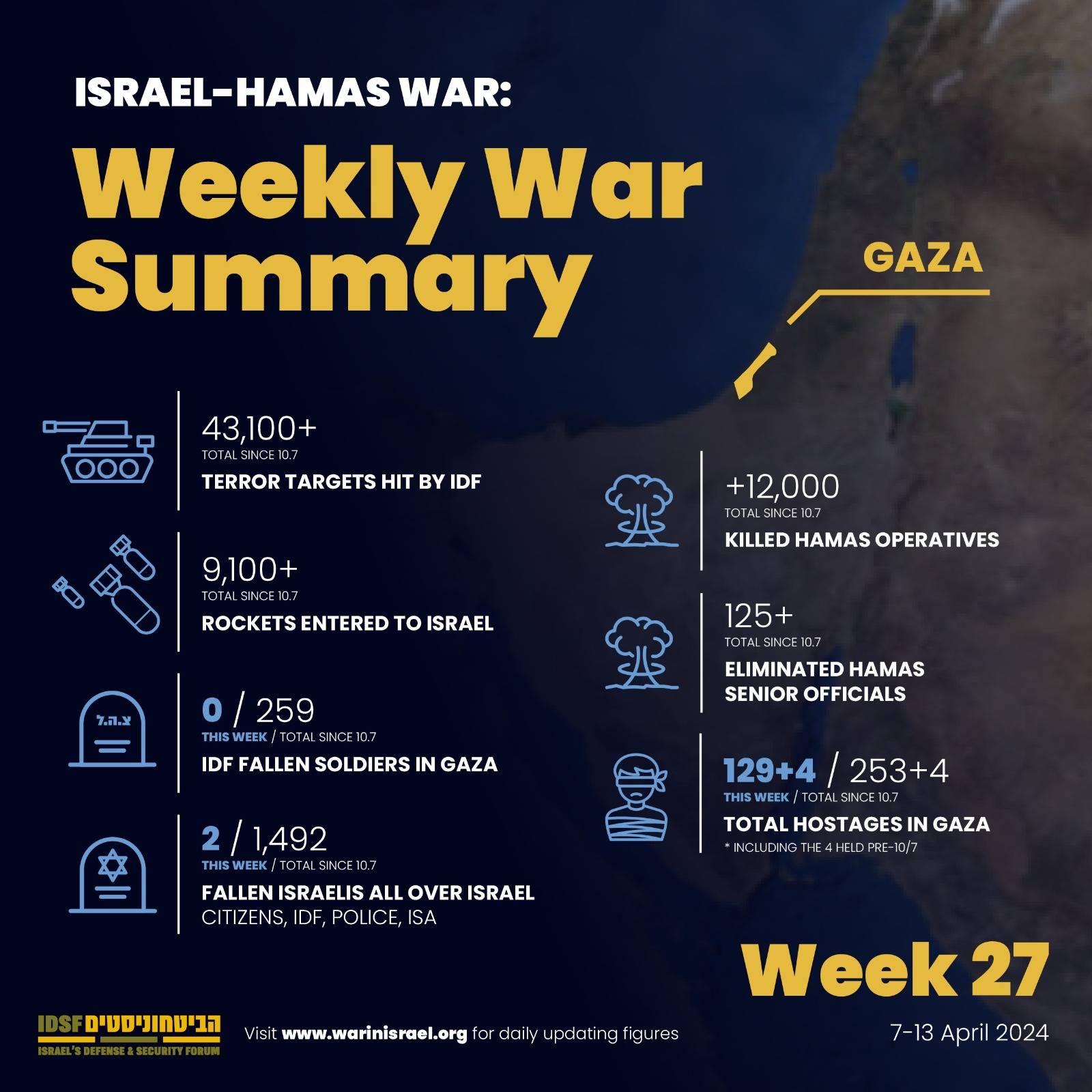
Gaza Strip
Diplomatic
Hostage Deal
The US is determined to conclude the war with a ceasefire deal and is pressuring Hamas via Qatar and Israel to be more flexible in their terms. After the previous suggested hostage deal included the release of 700 Palestinian terrorists from Israeli jails in exchange for 40 Israeli hostages Hamas increased their demand to 900 prisoners Including at least 100 prisoners who are serving life sentences for murdering Israelis. CIA Director William Burns presented the US terms in Cairo and Secretary Blinken stressed that the deal is serious while also putting the spotlight on Hamas by saying the “ball is in Hamas’ court and the world is watching to see what it will do”.
On Saturday, Hamas rejected the new and improved offer for a hostage deal, signaling it is looking for escalation rather than concluding the war.
Rafah Operation
Prime Minister Netanyahu has said over the past few days that Israel would commence operations in Rafah even if the US does not approve, and claimed that there is a date for the operation to begin after operative plans have been approved. This statement was later reportedly contradicted by Defense Minister Gallant who spoke on the phone with Defense Secretary Austin and said there is no date of a planned operation in Rafah. Gallant told Austin that Israel would have to take several crucial steps before an operation commences, including an orderly evacuation of the civilian population and an increase in humanitarian aid. The Administration’s officials including Secretary Blinken and National Security advisor Jake Sullivan have publicly stated that they did not receive a planned date for the operation, a way to publicly pressure Israel against acting without coordination.
After the Iranian attack against Israel, the focus is turned away from discussing the Rafah operation between Israeli and American officials. Strategic Affairs Minister Ron Dermer and National Security Adviser Tzachi Hanegbi were slated to fly to Washington this week to discuss the looming Rafah operation, but that trip has been postponed after the Iranian attack.
Military Aid
Foreign Affairs Committee Ranking Member Rep. Gregory Meeks (D-N.Y.) is facing pressure from “at least a dozen” Democrats on his committee to exercise his power to block a deal that would deliver Israel with more F-15’s as part of plans to create a new squadron. Meeks asked to review assurances from Israel that it will use the weapons in accordance with international law and allow humanitarian aid into Gaza. The delivery is planned to arrive in 5 years and Meeks’ approval is required under the Arms Export Control Act. In essence, he has the power, even as leader of the minority party in the House Foreign Affairs to withhold US weapon sales. After viewing assurances given by Israel Meeks did not commit to sign on the deal, which potentially could indicate another exacerbation in US-Israeli rift.
Hamas-Run Gaza Health Ministry
After months of inconsistent claims and exaggerated casualty numbers, the Hamas run Gaza Health Ministry admitted on April 6th, that they had manipulated the numbers of casualties by saying that it had “incomplete data” for 11,371 of the 33,091 Palestinian fatalities it claims to have documented. On April 3 it acknowledged in a report the presence of incomplete data, but did not define what it meant by “incomplete.” In that earlier report, the ministry acknowledged the incompleteness of 12,263 records, 900 more than the report 3 days later. It claimed that more than 15,000 fatality records had stemmed from “reliable media sources” without mentioning the sources. Gaza also does not have independent media.

Operational
The IDF has pulled most of its troops from Gaza leaving only one Brigade to take the post in the new 749 Route (Netzarim Corridor) dividing Gaza Strip from North to South and preventing any movement from the south to the north. At the height of the ground maneuvers the IDF had used up to 5 divisions and around 35,000 soldiers which included 27 brigades.
The IDF evacuated Khan Younis and pulled out Division 98 completely, after four and a half months. Hours after pulling out, 4 rockets were launched from Khan Younis towards the Gaza envelope area.
The IDF says the reason for pulling out so many soldiers are for retraining and refreshing as some troops have continually fought for over 4 months. The war is in its third stage in most areas – which includes counterinsurgency raids against remaining pockets of resistance from disbanded Hamas battalions that are attempting to regroup and re-organize. There are some signs of Hamas demonstrating elements of sovereignty by deploying Hamas henchmen to police the streets using bats and batons. They are avoiding carrying weapons that could be seen by IDF drones and targeted. Hamas’ men are patrolling the area the IDF left and are trying to recover their civilian rule which includes the monitoring of food prices.
- The Israeli Air Force eliminated Hatem al-‘Omari, the mayor of Al-Mawasi, who also served as the chairman of Hamas’ government emergency committee in the central camps in the Gaza Strip. As part of his role, he was responsible for launching improvised missiles in the Ma’azi battalion of the Central Camps Division.
- The IDF eliminated three sons of Hamas’ political bureau chief Ismail Haniyeh. The three sons – Amir Haniyeh, a commander of a cell in the military arm of Hamas, Mohammed Haniyeh, a military activist in Hamas, and another military activist in Hamas, Hazem Haniyeh were on their way to carry out a terrorist activity in the center of the Gaza Strip. It was reported that one of Haniyeh’s sons, was involved in the holding of Israeli hostages.
- The IDF conducted ground and air strikes in Nuseirat refugee camp in Gaza.
- The Israeli Coordinator of Government Activities in the Territories (COGAT) reported on Wednesday, April 10, that, the repair of the Bani Suheila water line has been completed.
The water line will now supply over 400,000 people in central Gaza with an additional 42 liters of high-quality water per person each day.
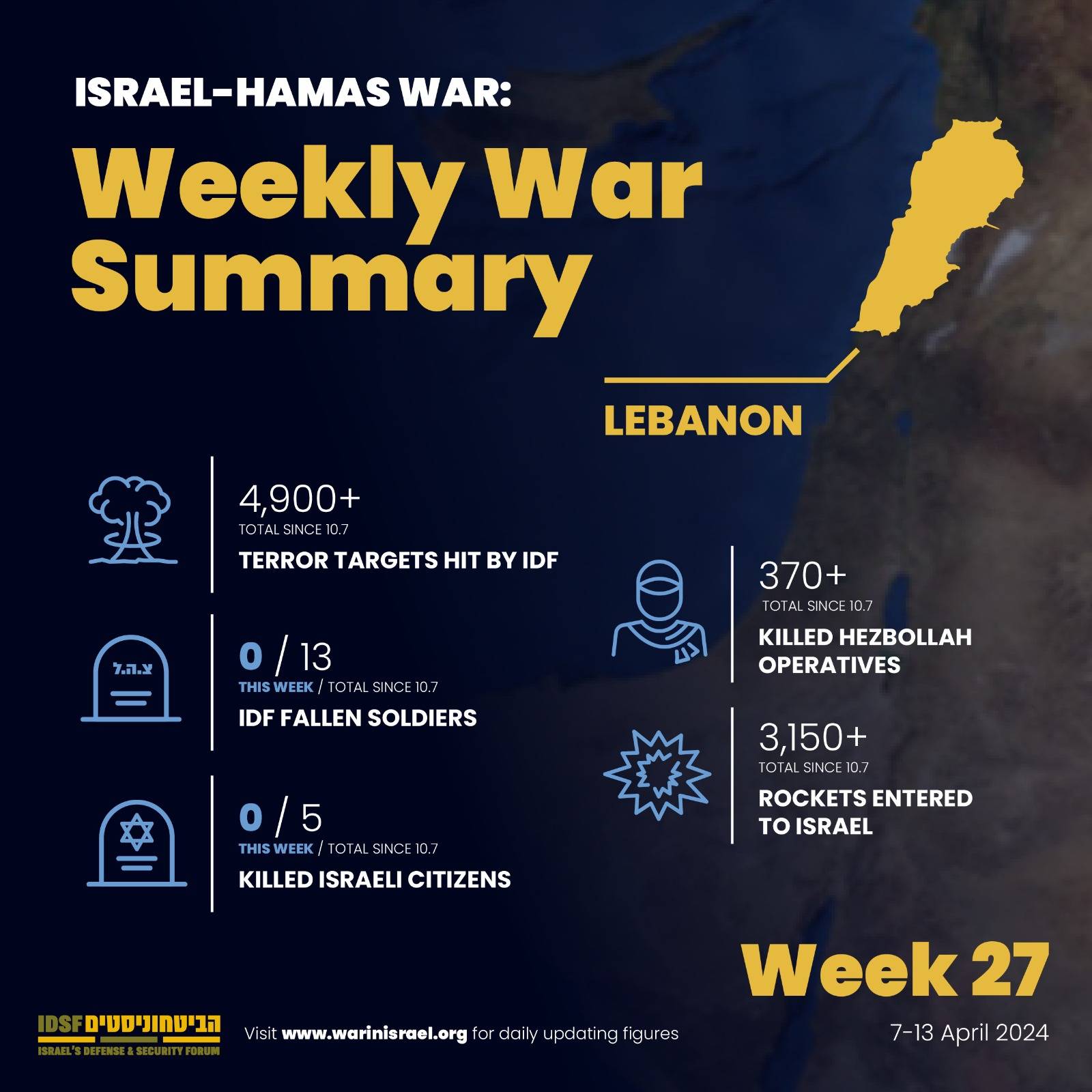
Lebanon
The Israeli Air Force and artillery were not restrained during Ramadan and were consistently attacking, hitting Ita al-Shaab and other towns hard on the last day of Ramadan. The IDF attacked a large military complex of the Radwan force in southern Lebanon. Combat aircraft struck a military complex containing seven military buildings of the Radwan force, affiliated with the terrorist organization Hezbollah, in the Al-Hiyam area. Additionally, IDF forces attacked a military headquarters associated with the organization in the area of Kfar Toure.
IDF forces attacked the sources of fire in the areas of Kokhba and Mays al-Jabal in southern Lebanon in response to launches that were identified earlier in the day towards the Golan Heights and the Manara area.
In response to the downing of the UAV, the IDF attacked Hezbollah’s air defense array in the Baalbek (more than 100 KM into Lebanon) area and hit three sites military infrastructures of Hezbollah’s air defense array.

Judea and Samaria
- Jerusalem resident, Benjamin Achimeir, 14, went missing while shepherding. His body was later found by security forces and a man hunt was opened to find his murderers after the incident was determined to be a terrorist attack. This comes after increased clashes between settlers and Palestians including in al-Mughayyir, Beitin and Duma. The Palestians report that one Palestinian man was killed and several other were injured. After security forces found the body, several settlers went into Palestinian towns and vandalized cars and property.
- IDF, Shin Bet, and Border Police forces eliminated Muhammad Omar Dra’ameh, the head of Hamas’ terror infrastructure in Tubas, in a brigade operation in the Jordan Valley
- New PA Prime Minister, Muhammad Mustafa began a series of visits to Arab countries. The visits included Jordan, where he met with the Prime Minister of Jordan, Egypt, where he met with President Abdel Fattah el-Sisi, and Saudi Arabia, where he was received by the Saudi Deputy Foreign Minister.
- The New York Times reported that Iran is operating secret smuggling routes across the Middle East and using intelligence agents, militia members, and criminal gangs to transfer weapons to Palestinians in Judea and Samaria. According to three Iranian sources, Iran’s goal is to stir unrest against Israel by flooding Judea and Samaria with weapons. The report states that Iran is transferring weapons through two routes from Iran via Iraq, Syria, Lebanon, Jordan, and into Israel, utilizing members of organized crime gangs, extremists, soldiers, intelligence agents, and Bedouin smugglers who move the weapons across the border between Jordan and Israel. Most of the smuggled weapons are small arms, such as pistols and assault rifles, but also include advanced weaponry, including anti-tank missiles and RPGs.
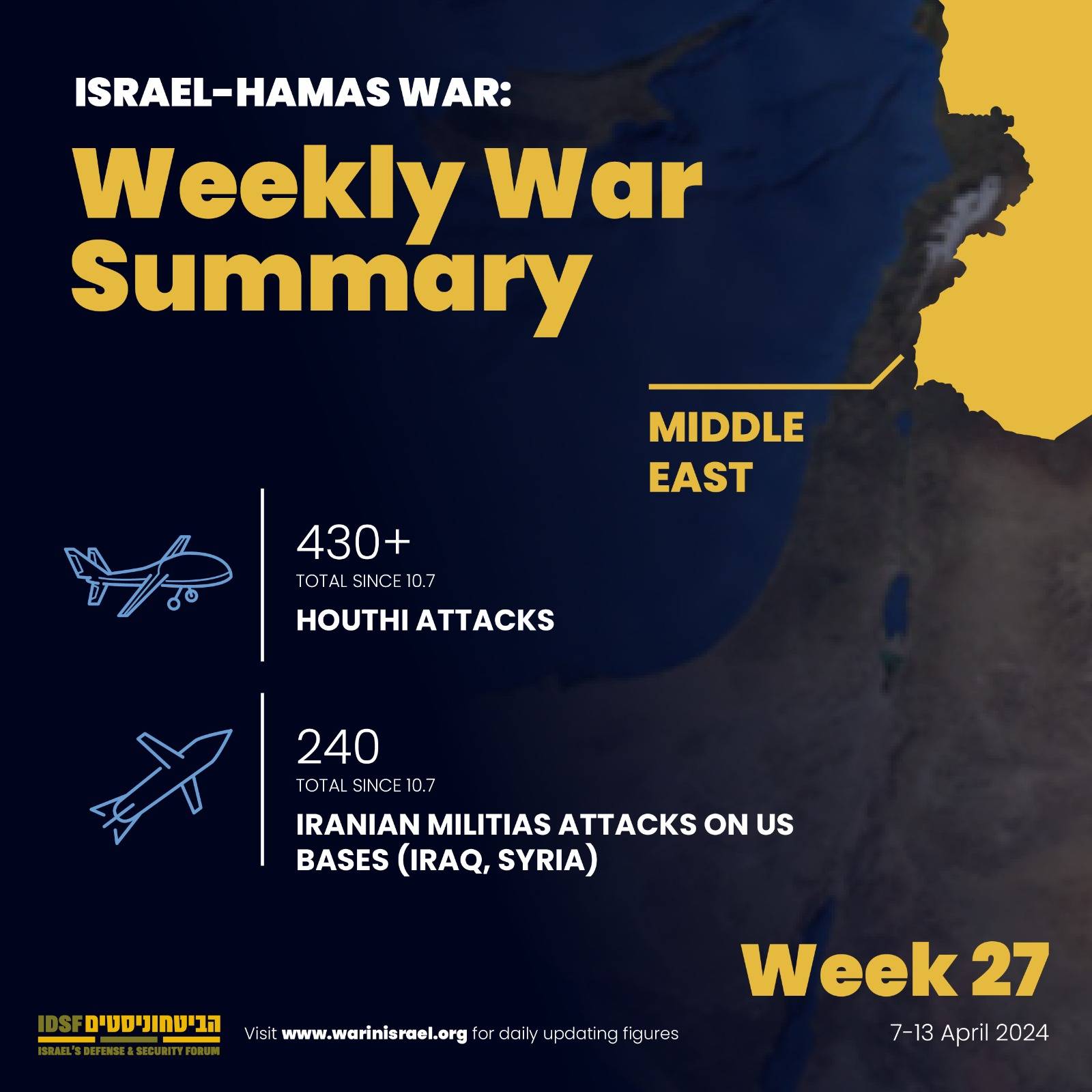
Yemen
The military spokesperson for the Houthis, Yahya Saree, has taken responsibility for attacking three merchant ships: the hijacking of a British ship (HOPE ISLAND) in the Red Sea and the attack on two “Israeli” ships sailing towards Israel, the first (MSC GRACE F) in the Indian Ocean, and the second (MSC GINA) in the Arabian Sea.
Iraq and Syria
- Iraqi militia, “Islamic Resistance in Iraq” has said they attacked Israel in Eilat with a drone. Israel’s Iron Dome System that was mounted on a ship intercepted the UAV, a first successful interception with the system at sea. Israel did not confirm whether the UAV did come from Iraq.
